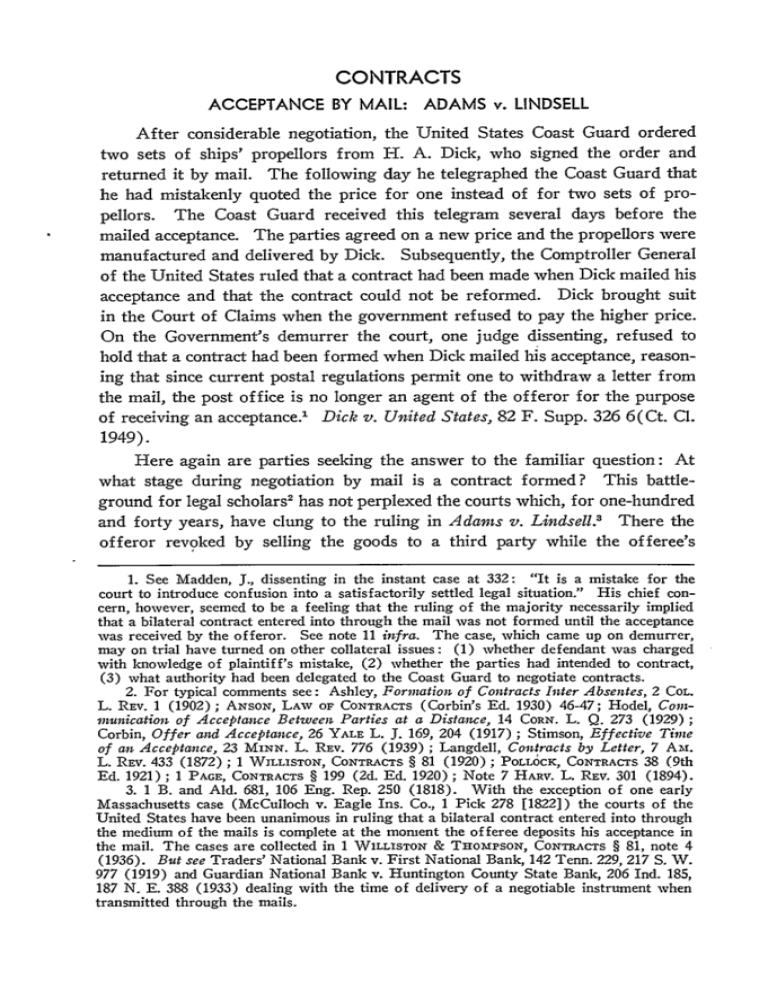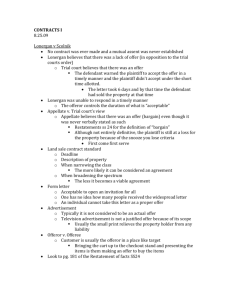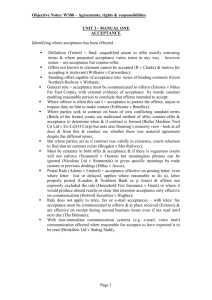Acceptance by Mail: Adams v. Lindsell
advertisement

CONTRACTS ACCEPTANCE BY MAIL: ADAMS v. LINDSELL After considerable negotiation, the United States Coast Guard ordered two sets of ships' propellors from H. A. Dick, who signed the order and returned it by mail. The following day he telegraphed the Coast Guard that he had mistakenly quoted the price for one instead of for two sets of propellors. The Coast Guard received this telegram several days before the mailed acceptance. The parties agreed on a new price and the propellors were manufactured and delivered by Dick. Subsequently, the Comptroller General of the United States ruled that a contract had been made when Dick mailed his acceptance and that the contract could not be reformed. Dick brought suit in the Court of Claims when the government refused to pay the higher price. On the Government's demurrer the court, one judge dissenting, refused to hold that a contract had been formed when Dick mailed his acceptance, reasoning that since current postal regulations permit one to withdraw a letter from the mail, the post office is no longer an agent of the of feror for the purpose of receiving an acceptance.' Dick v. United States, 82 F. Supp. 326 6(Ct. Cl. 1949). Here again are parties seeking the answer to the familiar question: At what stage during negotiation by mail is a contract formed? This battleground for legal scholars 2 has not perplexed the courts which, for one-hundred and forty years, have clung to the ruling in Adams v. Lindsell.3 There the offeror revoked by selling the goods to a third party while the offeree's 1. See Madden, J., dissenting in the instant case at 332: "It is a mistake for the court to introduce confusion into a satisfactorily settled legal situation." His chief concern, however, seemed to be a feeling that the ruling of the majority necessarily implied that a bilateral contract entered into through the mail was not formed until the acceptance was received by the offeror. See note 11 infra. The case, which came up on demurrer, may on trial have turned on other collateral issues: (1) whether defendant was charged with knowledge of plaintiff's mistake, (2) whether the parties had intended to contract, (3) what authority had been delegated to the Coast Guard to negotiate contracts. 2. For typical comments see: Ashley, Formation of Contracts Inter Absentes, 2 CoL. L. REv. 1 (1902); ANSON, LAW OF CONTRACTS (Corbin's Ed. 1930) 46-47; Hodel, Colnmnunication of Acceptance Between Parties at a Distance, 14 CORN. L. Q. 273 (1929) ; Corbin, Offer and Acceptance, 26 YALE L. J. 169, 204 (1917) ; Stimson, Effective Time of an Acceptance, 23 MINN. L. Rxv. 776 (1939) ; Langdell, Contracts by Letter, 7 AM%. L. REV. 433 (1872) ; 1 WILLISTON, CONTRACTS § 81 (1920); POLL&cK, CONTRACTS 38 (9th Ed. 1921); 1 PAGE, CONTRACTS § 199 (2d. Ed. 1920); Note 7 HARv. L. REV. 301 (1894). 3. 1 B. and Ald. 681, 106 Eng. Rep. 250 (1818). With the exception of one early Massachusetts case (McCulloch v. Eagle Ins. Co., 1 Pick 278 [1822]) the courts of the United States have been unanimous in ruling that a bilateral contract entered into through the medium of the mails is complete at the moment the offeree deposits his acceptance in the mail. The cases are collected in 1 WILLISTON & THompSON, CONTRACTS § 81, note 4 (1936). But see Traders' National Bank v. First National Bank, 142 Tenn. 229, 217 S. W. 977 (1919) and Guardian National Bank v. Huntington County State Bank, 206 Ind. 185, 187 N. E. 388 (1933) dealing with the time of delivery of a negotiable instrument when transmitted through the mails. RECENT CASES acceptance was in the mail.4 The court was doubtless influenced by a realization that, if commerce were to be facilitated and business to prosper, the of feree should be able to rely upon his acceptance as early as possible, thus encouraging him to execute the contract secure in the knowledge that his expectations would not be defeated by a withdrawal of the of fer. Opposing this result, however, was the legal doctrine that an "irrevocable offer was a legal impossibility," requiring the offeree and offeror to be bound simultaneously." This conflict was resolved by holding the bilateral contract to 4. The actual facts were that the offer, which was limited to "acceptance by return post," was misdirected and reached the offeree late. The offeree replied immediately, but by the time the acceptance had reached the offeror, he had sold the goods to another. The court ruled that the contract was complete at the moment the offeree mailed the acceptance. The decision of the court was, of course, shaped by the then existing subjective theory of contracts. A strict adherence to the subjective theory would have produced the absurd result that there would never be an actual simultaneous meeting of the minds (because of the time necessary for the delivery of correspondence) ; therefore contracts could not be completed with the parties at a distance. To meet this situation the court invented the doctrine of the continuing offer. If the offer could be considered as continuing and being reiterated every minute of its existence until accepted, then simultaneous identity of minds was achieved. Notice, however, that the court could explain their results only through the device of a fiction. Adams v. Lindsell, 1 B. & Ald. 681, 106 Eng. Rep. 250 (1818). It is interesting to note that under the objective theory of contracts the same result could be reached as in Adams v. Lindsell by holding that the mailing of the acceptance was sufficient outward manifestation of assent for completion of the contract. See Ashley, Formation of Contracts Inter Absentes, 2 COL. L. REv. 1 (1902); Ashley, Mutual Assent in Contracts, 3 CoL. L. REv. 71 (1903) ; Ferson, The Formation of Simple Contracts,9 CoRN. L. Q. 402 (1924) ; Williston, Mutual Assent in the Forination of Contracts, 14 ILL. L. REv. 85 (1919). 5. See Household Fire Ins. Co. v. Grant, 4 Ex. D. 216, 224 (1878) where Thesiger, L. J. in arguing for early protection of the of feree states: If the contract is not finally concluded, except in the event of the acceptance actually reaching the offeror . . . considerable delay in commercial transactions, in which dispatch is, as a rule, of the greatest consequence, would be occasioned. See also Harris' Case, L.R.7 Ch. 585, 594 (1872) where Mellish, L. J. says: I have been forcibly struck with the extraordinary and very mischievous consequences which would follow if it were held that an offer might be revoked at any time until the letter accepting it had actually been received. . . . Every day, I presume, there must be a large number of mercantile letters received which require to be acted upon immediately . . . The merchant writes an answer accepting the offer and goes that instant into the market and purchases the goods in order to enable him to fulfill the contract . . . but . . . if the person who has sent the offer . . . may at any time, before he has received the answer, revoke his offer, the consequences might be very serious for the merchant.... For reasons for protecting and an excellent definition of expectation interests see, Fuller & Perdue, The Reliance Interest in Contract Damages, 46 YALE L. J. 52, 57-66 (1936). 6. The firmly established doctrine of consideration plays an important role here. The concept is that any offer may be freely revoked up until the time that the full consideration requested is received. Cooke v. Oxley, 3 T. R. 653 (1790) ; McGovney, Irrevocable Offers, 27 HARv. L. REv. 644 (1914); 1 ASHLEY, THE LAW OF CONTRACTS 26 (1911); 1 LANGDELL, SUMMARY OF CONTRACTS §178 (1880). The rule in some of the civil law countries is that an offer made by mail can not be revoked within a certain period fixed INDIANA LAW JOURNAL be formed when the acceptance is mailed.? Not challenged here is the application of the Adams v. Lindsell rule where an offeror attempts to revoke his offer after the acceptance has been mailed. But where the offeree withdraws or countermands his acceptance by communication reaching the offeror before the acceptance, as in the Dick case, the reasons behind Adams v. Lindsell disappear. The offeree, not desiring to rely upon his acceptance, has no interests needing protection. Nor has the offeror any interests requiring protection.8 Though the offeror is denied the opportunity to extend new offers after the acceptance has been mailed, this limitation is assumed by any offeror and is a restriction flowing from commercial practices. It does not result from reliance upon an offeree's acceptance because the offeror can have no knowledge of the acceptance until he has learned of the withdrawal. Yet, in this situation Adams v. Lindsell prohibits withdrawal by the offeree and extends unjustified protection to the offeror. The rationale of the Court of Claims negativing the agency fiction,9 while commendatory, is scarcely a satisfactory solution to the problem. The fiction was developed to achieve a mechanical solution and is not adapted to the realities of commercial transactions between distant parties. Yet, the obliteration of this fiction requires the innovation of an alternative theory of contract. The court failed to provide such assistance and say when a contract is formed, but contented itself with the declaration that the contract was not formed when the acceptance was mailed.'0 Presumably the court deemed it obvious that the contract was not completed until the acceptance by law regardless of whether any consideration has been received by the offeror. This concept has received legislative expression in Germany, France, Italy, Switzerland, and Japan. See Nussbaum, Comparative Aspects of Anglo-American Offer-and-Acceptance Doctrine, 36 COL. L. REv. 920, 922-23, N. 15-23 (1936). Anglo-American courts in the main still accept the "revocability doctrine" and have begun to modify it only in the field of unilateral contracts. See note 13 infra. 7. For the suggestion that this was somewhat of a compromise solution see Nussbaum, Comparative Aspects of the Anglo-American Offer-and-Acceptance Doctrine, 36 COL. L. REv. 920, 925 (1936) where it is said: However, the consideration doctrine stood in the way of holding irrevocable an offer made neither for value nor under seal. . . . In this situation protection for the offeree could be attained only by the Adams v. Lindsell rule. This was the best solution that could be reconciled with the consideration doctrine. 8. See note 5 supra. Notice that fundamental to expectation interests is knowledge of the promise of another. Without such knowledge the interests cannot arise. 9. That the concept of agency as used here is artificial has been recognized by both the legal writers and the courts. See Henthorn v. Fraser, L. R. 2 Ch. 27, 33 (1892) ; Bramwell, L. J. dissenting in Household Fire and Carriage Acc. Ins. Co., Ltd. v. Grant, 4 Ex. D. 216 (1879) ; Hodel, Communication of Acceptance Between Parties at a Distance, 15 CORN. L. Q. 273, 275 (1929) ; Stimson, Effective Time of an Acceptance, 23 MINN. L. REv. 776, 781 (1939). 10. Dick v. United States, 82 F. Supp. 326, 330 (1949). RECENT CASES was received by the offeror3 1 But this view fails to protect the legitimate expectancy of the of feree from revocation of the offer in the interim between posting and receipt of the acceptance, and frustrates the purpose of Adams v. Lindsell. Modem contract thinking calls for a re-examination of the ancient dogma that an irrevocable offer is a legal impossibility. In recent years this doctrine has been modified by the Anglo-American courts. Despite theoretical difficulties,'- the courts have protected the offeree's interest created through part performance of a unilateral contract, by holding the offer irrevocable for a reasonable time.1 3 Yet even after partial performance the offeree is not bound to complete performance but may withdraw providing he injures no interest of the offeror in so doing.1 4 The most satisfactory solution would 11. This assumption was made by Madden J. dissenting in the instant case at 332: The court's decision would mean, quite certainly, that a contractor who had mailed his acceptance of an offer made to him by the Government would still be subject to losing his contract if the Government should, before it receives his letter of acceptance, telephone or telegraph him withdrawing the offer. 12. 1 WALD'S POLLOcK 34, n. 39 (3d ed., Williston, 1906): On principle it is hard to see why the offeror may not revoke his offer. He cannot be said to have already contracted, because by the terms of his offer he was only to be bound if something was done, and it has not as yet been done, though it has been begun. Moreover, it may never be done, for the promisee has made no promise to complete the act and may cease performance at his pleasure. To deny the offeror the right to revoke is, therefore, in effect to hold the promise of one contracting party binding though the other party is neither bound to perform nor has actually performed the requested consideration. The practical hardship of allowing revocation under such circumstances is all that can make the decision of the question doubtful. See also McGovney, Irrevocable Offers, 27 HARV. L. REv. 644, 654 (1914) ; Levinsohn, Mutual Assent in Califonia, 2 CALIF. L. REv. 345, 358 (1914) ; Wormser, Unilateral Contracts,26 YALE L. J. 136 (1916). 13. This rule resulted from the realization that strict adherence to the revocability doctrine creates undue hardship on the of feree in the case of unilateral contracts where the offeree has partially performed the requested act and the offeror attempts to withdraw his offer. See Ruess v. Baron, 217 Cal. 83, 10 P.2d 518, 519 (1932) : The growing tendency among American Courts, working through the medium of the litigated cases, has been to ameliorate the hardships inherent in holding that such an offer may be revoked at any time before full performance and to hold that such an offer cannot be revoked after the offeree has done some substantial act looking to performance. See also Los Angeles Traction Co. v. Wilshire et al., 135 Cal. 654, 67 Pac. 1086 (1902); Wachtel v. National Alfalfa Journal Co., 190 Iowa 1293, 176 N. W. 801 (1920); RESTATEMENT, CONTRACTS §45 (1932) ; Ballantine, Acceptance of Offers for Unilateral .Contractsby PartialPerformance of Service Requested, 5 MINN. L. REv. 213 (1934); Ashley, Consideration Other Than a Counter Promise, 23 HAv. L. Rv. 159 (1909). 14. 1 WILISTON & THaomPsoN, CONTRACTS § 60 (1936) ; Plumb v. Campbell, 129 III. 101, 18 N. E. 790 (1888). RESTATEMENT, CONTRACTS § 45 (1932) : If an offer for a unilateral contract is made, and part of the consideration requested in the offer is given or tendered by the offeree in response thereto, the offeror is bound by a contract, the duty of which is conditional on the full consideration being given or tendered within the INDIANA LAW JOURNAL be to extend to bilateral contracts this "part performance" concept. The problems in unilateral and bilateral offers are analogous: i.e., how to protect the interest created by the offeree in himself when he accepts an offer. The interests of the bilateral-offeree can be adequately protected by holding the mailing of the acceptance to be sufficient part performance to render the offer irrevocable for a reasonable time.15 Continuing the analogy to the unilateral-offeree, the bilateral-offeree would likewise be free to withdraw his acceptance prior to receipt of it by the offeror, if in so doing no interest of the offeror is injured. 16 Such a solution would succeed where both Adams v. Lindsell and the "complete on receipt" rules fail. The interests of the time stated in the offer, or, if no time is stated therein, within a reasonable time. But see 3 PROCEEDINGS A.L.I. 256 (1929) where Professor Williston stated that he interpreted § 45 of the Restatement to mean only that the offer should be irrevocable, and apparently it was with this understanding that § 45 was incorporated into the Restatement. 15. Note that in the civil law countries an offer made through the mails is irrevocable when made (Nussbaum, Comparative Aspects of the Anglo-American Offer-and-Acceptance Doctrne, 36 COL. L. REv. 920 [1936]) ; here the offer is not irrevocable until the acceptance is mailed. This difference is necessitated by the doctrine of consideration which governs the Anglo-American courts. Consideration can be found here in the change of position of the offeree in the act of mailing the acceptance. As in the case of unilateral contracts, the time during which the offer is to remain irrevocable must be a "reasonable time." RESTATEMENT, CONTRACTS § 45 (1932). The test here of what is a reasonable time would seem to be the time necessary for the posted acceptance to reach the offeror under normal conditions of the 'mail. Further, the offeror's duty of performance would be conditional on full consideration being given, i.e. delivery of the letter of acceptance. Under this limitation the risk of loss or delay of the letter in the mail is placed on the offeree. Cf. UNIFORM COMMERCIAL CODE § 2-206 (3) and comment 3 (May 1949). 16. Pollock would agree with this position. See WALD'S POLLOCK 37 (3d ed., Williston, 1906) where it is stated: It appears just and expedient, as concerning the accepting party's rights, that the acceptance should date from the time when he has done all he can to accept, by putting his affirmative answer in a determinate course of transmission to the proposer. From that time he must be free to act on the confract as valid, and disregard any revocation that reaches him afterwards. Hence the conclusion is suggested that at this point the contract is irrevocable and absolute. But are we to hold it absolute for all purposes? Shall the proposer be bound, though, without any default of his own, the acceptance never reaches him? Shall the Acceptor remain bound, though he should afterwards dispatch a revocation which arrives with or even before the acceptance? The first question is answered by our Courts in the affirmative; the second is still open. On principle a negative answer to both would seem more reasonable. The proposer cannot, at all events, act on the contract before the acceptance is communicated to him; as against him, therefore, a revocation should be in time if it reaches him together with or before the original acceptance, whatever the relative times of their dispatch. On the other hand, it seems not reasonable that he should be bound by an acceptance that he never receives. He has no means of making sure whether or when his proposal has been received, or whether it is accepted or not, for the other party need not answer at all. The acceptor might more reasonably be left to take the more avoidable risk of his acceptance miscarrying. RECENT CASES offeree in the revocation-of-offer situation would be protected by making the offer irrevocable when the acceptance is mailed without at the same time granting unneeded protection to supposed interests of the offeror in the withdrawal-of-acceptance situation. The "part performance" approach to the problem might be criticized because it gives complete control of the situation to the offeree, leaving him free to blow "hot" and "cold" during the transmission time.17 But the same result attains under present practice because the postal regulations allow withdrawal of the acceptance from the mail any time prior to delivery, without the knowledge of the offeror. 8 So, while the offeree is theoretically bound by Adams v. Lindsell at the time of posting, he retains control as a practical matter through his withdrawal privilege. By extending the "part performance" concept, theory would coincide with practice. 19 To the objection that such a rule would shift to the of feree the risk of loss or delay of the acceptance, it may be answered that where one of two innocent parties must suffer, the risk should be placed on the one best able to protect himself.2" The off eree may protect himself by registering his letter of acceptance. While certainty in commercial law is of great importance, stare decisis is no excuse for perpetuating a doctrine so broad as to treat alike situations which are fundamentally different. 17. Many of those who have objected to the development of the theory of the irrevocable offer in the field of unilateral contracts have done so on the ground that it is against settled contract principles to have one party bound while the other remains free. See notes 12 and 13 supra and 9 A.L.R. 386. 18. §§ 487, 488, and 489 of "United States Postal Laws and Regulations, 1893" provide that a sender may apply for a letter in the mails and when properly identified may receive it back. "The postmaster applied to shall telegraph a request. On receipt of such request the postmaster at the office of address shall return such letter to the mailing postmaster . . . who will deliver it to the writer upon payment of all expenses." To the same effect see United States Postal Laws and Regulations §552, 553 (1913). See United States Postal Laws and Regulations §730 (1940) which provides that the addressee shall not be notified that a letter addressed to him has been withdrawn from the mails. 19. This development in Post Office Regulations is not of recent origin. The situation existed as long ago as 1893. See Note, 7 HARV. L. REv. 301 (1893) where it is said: By sections 487, 488, and 489 of "Postal Laws and Regulations, 1893" it appears that the writer may apply for a letter in the mails, and when satisfactory proof of identity has been furnished, may receive it back . . . The result of this conflict of law and postal regulation is that the original proposer of a contract is bound from the time of acceptance; the acceptor is not bound in practice until his leter has been delivered. He may be bound in law, but if he gets his letter back and burns it up, he cannot be held in court. So for one party to the contract we have one rule, for the other the other. 20. It is argued by many that the offeree has implied authority to use the means of communication used by the offeror. The offeror has made the postal authorities his agent and therefore receipt of the letter of acceptance by the post office would be receipt by the offeror. Therefor the risk of loss should fall on the offeror. See Dunlop v. Higgins, 1 H. of L. 381 (1845); Duncan v. Topham, 8 C. B. 225 (1849); Vassar v. Camp, 1 Kernan 441 (N. Y. 1854). This reasoning, however, is based on a highly fictitious concept of agency.








